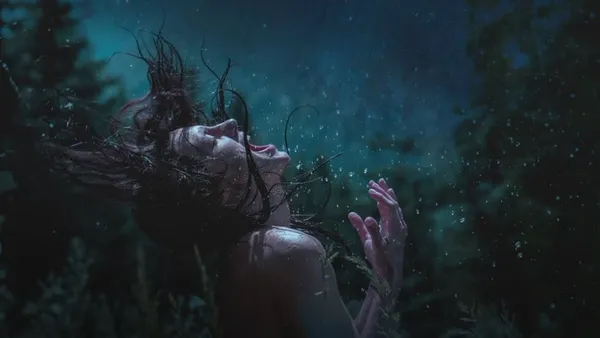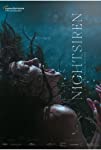Eye For Film >> Movies >> Nightsiren (2022) Film Review
Nightsiren
Reviewed by: Jennie Kermode

One of the things which makes death so hard to reckon with is the way that it can transform the world in an instant. A loved one is there; then they are not. At the start of this film we see two young girls running. Shouts follow them. They are plainly afraid of violence. Šarlota drags Tamara by the hand. At a distance from the house they pause. She looks back. All at once, Tamara falls away from her, off the side of a cliff, into the yawning abyss of eternity.
How is anybody to cope with such a thing? We don’t see Šarlota again for many years. Now she is an adult (played by Natalia Germani), returning to the house in the aftermath of her abusive mother’s death. To call it a house is perhaps a bit of a stretch. It’s the quintessential cabin in the woods which we see so often in horror films, partially broken down, thick with dust inside. Indeed, local teenagers visit it in order to scare each other with stories of the witch supposed to inhabit it. When they see Šarlota there, two worlds abruptly clash. In their eyes she takes on the persona of the witch. Explaining her identity doesn’t really help with that. The very fact that she’s become an urban creature, with modern values and a self-assurance not seen as natural in a woman, makes her seem more alien here, and therefore more like some imagined monster from the deep past.
Every now and then, in the background of Tereza Nvotová’s film, we catch a glimpse of the nearby motorway. It is only this, and some of Šarlota’s clothing, which really tell us that what we’re watching is situated in the present day. Primitive superstitions have a strong hold in this place. Šarlota is a registered nurse, but her efforts to step in an help people in trouble are perceived – as such efforts have often been historically – as attempts to do harm. When a man casually sexually assaults her and she fends him off, she is labelled as a troublemaker and called a slut. When she befriends mysterious local herbalist Mira (Eva Mores), the only person willing to give her the time of day, the two of them attract homophobic attention.
Nightsiren shares its location with Antonia Bird’s Ravenous and there is a similar sense of the uncanny about it, of that space in which madness and the supernatural intersect. Nvotová is well versed in the language of the horror film, and some scenes echo the early work of Neil Jordan, but go much further in their hallucinatory concatenation of the forest wild and the monstrous feminine. Snakes writhe on the ground; wolves howl; thick mist obscures the way. When white-robed women dance in a secret glade by night, it is not for men’s eyes to see. The original title of the film, Svetlonoc – which translates roughly as ‘bright night’ – suggests not the lure of a siren but something closer to discovery made in a hidden place.
Juxtaposing these surreal moments with the women’s ugly experiences in day to day life, the film builds towards crisis as it becomes clear that the villagers are not going to stop harassing them but are, in fact, prepared to take violent action to get rid of what they see as a threat. There is a reflection here on the current political situation in Slovakia, which, like many other parts of Europe, is witnessing a backlash against progressive values, including some of the most basic rights of women. Out in the backwoods with no obvious help nearby, Šarlota and Mira may seem uniquely vulnerable, but this is part of something bigger. Reason struggles to prevail. Weighed down by guilt, Šarlota must contend with the void and everything that has emerged from it.
Nightsiren screened at the 2023 Glasgow Film Festival.
Reviewed on: 06 Mar 2023

















